Pete Malinverni has played everywhere over the past 15 years, from local bars and clubs to Carnegie Hall; all the while, the New York-based pianist – described by The Boston Herald as one of the city’s greatest – has served as Minister of Music at the Devoe Street Baptist Church in Brooklyn, a predominantly African-American congregation.
 Like Mary Lou Williams – and Duke Ellington to a lesser extent – before him, he combines jazz with gospel music. And just as importantly, refuses to dumb either down in the process.
Like Mary Lou Williams – and Duke Ellington to a lesser extent – before him, he combines jazz with gospel music. And just as importantly, refuses to dumb either down in the process.
Last year he released Joyful!, an original song cycle for Gospel Choir and Jazz Ensemble based on the Psalms of David. It’s an ambitious endeavor, and succeeds admirably in his goal of reuniting Gospel and Jazz. The disc garnered rave reviews across the board, including a four-star rating from Down Beat.
This month sees the New York City premiere of The Good Shepherd Suite, an extended work in six movements for Gospel Choir and Jazz Orchestra. Like Joyful! it’s inspiration came from the Psalms.
Malinverni describes jazz and gospel as long lost siblings separated at birth, and works at re-familiarizing the two.
“That was kind of my whole mission on Joyful!; to have the best jazz musicians I could find, and yet still have a gospel feeling to it. And it was great how everybody came to the fore. I think it proved that it can be done together.
“In other words, music with a spiritual basis does not have to be ‘dumb’ music. Nor does intense and complicated music have to ignore the spiritual. I think that Bach is the best example of that.
“I think they became separated for sociological reasons. When black musicians were playing in church, it was one thing, but for them to make a living – being that they were black – they were relegated to certain places in which to play. Like in New Orleans; these guys were playing in bordellos, and I think that really, that’s what it was. It was really a sociological thing more than it was anything else.”
The rejection went both ways. “Jazz musicians who came up in churches, let’s say a generation older than I, I think they rebelled, because they felt that the church to a certain extent was rolling over for racial injustice. The church was sort of Grandma’s world, it was square, an opiate for the masses, like Marx said.
“And really, I think that both [sides] seriously misjudged each other, in that I think church music can be much better if it’s allowed to be as musically rich as possible, and jazz music can be best if it addresses the human and spiritual more than just the intellectual.”
Jazz wasn’t his first love. Growing up in Niagara Falls, N.Y., Malinverni – who had played piano in church from the time he was eight years old – was enamored with funk and R & B.
Already familiar with classical, gospel and funk, his horizons broadened considerably during his late teens. “I started to hear jazz music late at night on the radio coming out of Buffalo. This station was playing straight ahead stuff – stuff I didn’t know anything about, and it just felt right. I was digging it.” He began to explore the music’s roots; “It became like an excavatory process; you remove one layer and get deeper, another layer and get deeper, until you’re transcribing Art Tatum.”
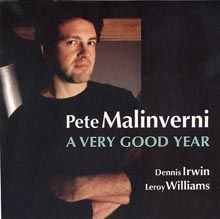 By the time he moved to New York City in 1981, he’d developed an economical style that brings to mind Ahmad Jamal and Bill Evans. “I came to New York to try to make a living as a jazz musician, and little by little I was able to meet people and start to get gigs.”
By the time he moved to New York City in 1981, he’d developed an economical style that brings to mind Ahmad Jamal and Bill Evans. “I came to New York to try to make a living as a jazz musician, and little by little I was able to meet people and start to get gigs.”
One of the most significant was with legendary drummer Mel Lewis’ famed Jazz Orchestra at the Village Vanguard. Malinverni featured Lewis and the band’s bassist, Dennis Irwin in a trio setting on his 1987 debut solo album Don’t Be Shy.
Lewis also appeared on his sophomore release, 1989’s The Spirit. 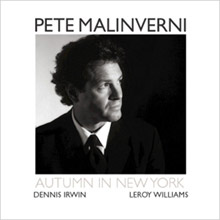 In 1997 Malinverni signed with Reservoir Music and released This Time. The disc featured Irwin and new drummer Leroy Williams [Thelonious Monk/Dizzy Gillespie/Sonny Rollins]. The trio was his format of choice (“We worked a lot together”) for almost a decade. A Very Good Year, came out in 1999, followed by Of One Mind, Autumn in New York, and the final trio release; 2004’s The Tempest.
In 1997 Malinverni signed with Reservoir Music and released This Time. The disc featured Irwin and new drummer Leroy Williams [Thelonious Monk/Dizzy Gillespie/Sonny Rollins]. The trio was his format of choice (“We worked a lot together”) for almost a decade. A Very Good Year, came out in 1999, followed by Of One Mind, Autumn in New York, and the final trio release; 2004’s The Tempest.
2006 brought Theme & Variations, a solo piano outing. Ranging from playful to contemplative, the disc manages to hold the listener’s attention throughout, and never comes across as indulgent.
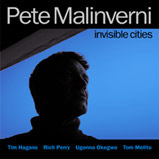 Following Joyful!, Malinverni returns to a more traditional format for his latest release, Invisible Cities, which features his new quintet (Tom Melito – drums/Ugonno Okegwo – bass/Tim Hagens – trumpet/flugelhorn/Rich Perry – tenor sax).
Following Joyful!, Malinverni returns to a more traditional format for his latest release, Invisible Cities, which features his new quintet (Tom Melito – drums/Ugonno Okegwo – bass/Tim Hagens – trumpet/flugelhorn/Rich Perry – tenor sax).
The inspiration came from the 1972 novel by Italian novelist Italo Calvino. After saluting various locales via original compositions and a handful of standards (‘I Love Paris,’ ‘Chicago,’ ‘Lonely Town’ from On the Town), the disc concludes with the traditional spiritual ‘A City Called Heaven.’
 Four star reviews and placement on critic’s year end lists only go so far. Despite the kudos, recognition outside the genre remains elusive. Noted jazz writer Scott Yanow ended one particularly effusive review by asking an obvious question; why isn’t this man better known?
Four star reviews and placement on critic’s year end lists only go so far. Despite the kudos, recognition outside the genre remains elusive. Noted jazz writer Scott Yanow ended one particularly effusive review by asking an obvious question; why isn’t this man better known?
He’s performed in South America, Europe and Japan, but it’s certainly not a life of constant travel. “I think as a piano player in New York, you end up playing a lot here – I’ve been blessed to make a living playing jazz music for many years, and I haven’t had to travel all that much. Maybe I’m out a total of six or eight times a year, but even then, it may be a week out, maybe a few days. Like I said; I’m blessed. I’m able to make a living playing in New York with the bands I like to play with.
“When you travel, there’s seldom sufficient money to bring your band. So often what you have to do is work with the best local players – which are great players and all that – but if you haven’t had the time to get to know each other, you end up playing stuff that’s easily picked up. I mean, if somebody calls me to work with them, I’m going to make sure I get their recordings and I’m going to know their music backward and forward. But not everyone does that.”
More road work would certainly increase his profile, but the difference – unpredictable musical situations versus staying at home with his regular band – is a no-brainer.
“I had a gig this past weekend at a club in the city; it featured the quintet that’s on my new recording, and we had so much fun. We had some really nice reviews, I got to play with some of the greatest musicians in front of a nice crowd, and I made a nice chunk of change. So I’m thinking; what else do I want??? I mean, I’m playing music with really great musicians.”
Surrounding himself with world-class players has been a constant right from his first albums with Mel Lewis. “I used to play a lot with Mel. The Spirit was his last record.”
Lewis – who passed away from cancer shortly after recording the album – has a discography that runs into the hundreds, from the big bands of Woody Herman, Benny Goodman and Stan Kenton to singers’ singers like Frank Sinatra and Ella Fitzgerald.
“He used to say he liked playing with me because I didn’t play too much, I left a lot of space. But geez, if I’m on the bandstand with Mel Lewis, or Vernell Fornier [Charlie Parker/Dizzy Gillespie/Ahmad Jamal], or Leroy Williams or whoever, I want to hear ‘em. I’m gonna shut up and listen while I’m there.
“Playing big band with Mel at the Village Vanguard was very interesting, because to me he sounded the same as he did when we played in small groups together. The beauty of that band was that it was a lot of guys sounding like a small group. Whether somebody’s soloing or there’s an ensemble, it still had the feeling of an agile, small group kind of thing. I used to go in on Mondays, and hear them burning, and he was playing brushes, man. A lot of that had to do with my friend, the great and recently passed bassist Dennis Irwin, too, because they really had a nice hook-up. That’s why I wanted to work with those two; ‘cause I heard how good they sounded. They were the two best I heard when I came to New York, so I just kinda started leeching around them.
“I was the kind of guy – and continue to be – I really go out of my way trying to play with people better than I.”
He doesn’t take into account potential sidemen’s faith; “What you’re doing is, A: you’re cutting down the pool of talent, which you should never do as a musician, and B: you might be costing yourself an opportunity to be a good witness. I hire people I think are good guys. And I don’t have to tell you, that pretty often, you find that there’s a belief system there.”
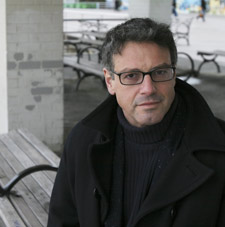
Similarly, while his music at times reflects on Biblical themes, it’s not intended as an evangelical tool. Malinverni doesn’t need a specific venue or situation to proclaim his faith. “I think I do that every time I go onstage, every time I don’t get angry when some other driver cuts me off in NYC.
“It’s faith and, maybe even more universally, an undiluted joy at being alive, in this moment, surrounded by love. I think that by focusing on that message one can reach more people who might be turned off by specific dogma.
“That’s one of the reasons I chose the Psalms [for Joyful! And The Good Shepherd] – I have a lot of colleagues, friends and in-laws who are Jewish, for example, and I certainly didn’t want to exclude them from enjoying or even participating.”
Malinverni’s own playing – and compositional approach – brings to mind the depth and majesty of Duke Ellington, “Well, certainly I’ve listened to Duke, of course. As a writer, I’m just fascinated by the sounds he’s able to get with that orchestra, and that was very much an inspiration, not to say a specific inspiration in terms of taking devices or whatever, but certainly it was an inspiration in terms of The Good Shepherd. Because to me, that’s the gold standard, what he did, because it still sounds soulful.”
Mary Lou Williams is another jazz player who wrote religious-based works. “As far as Mary Lou, I know about her Sacred Music, but my interest is more from what I’ve heard from [other musicians]. Many of the older guys have told me about what a great teacher she was. How Dizzy [Gillespie], Bud Powell and all these guys would go to her place and talk about harmony. Her place was sort of a crucible where everybody would go and hang out and work stuff out. She was very important to the whole development of bebop from a harmonic standpoint. She was a great writer; it was heavy music she was writing. Way ahead of it’s time.
One of his earliest influences came from outside the jazz world. “My man was Sly Stone in those days. I used to love Sly. And the closest thing I knew of in church music was what Andre [Andre Crouch, a pioneer at fusing gospel with funk] was doing. It turned out they both came from the same thing; they were both church musicians originally.”
Sly came out of retirement for a handful of appearances last year, and Pete was in the audience when he played New York; “For me it was a beautiful moment. I had seen him back when I was in high school – he came to Niagara Falls, and I was so into Sly I was front row center for that. But now to hear him as an adult; I thought it was beautiful, I really did. For me, it was an opportunity to see him and just be happy that he’s still alive.
“The guy is a miracle, because in the midst of that whole era, he was talking about positivity, he was not talking about anger. And even today, his music is still relevant. In fact, I put ‘Everybody is a Star’ on my solo piano record.”
Like many of Stone’s compositions, the song’s lyric – “I love you for who you are/not the one you feel you need to be” – is unstintingly optimistic. “It’s just positivity. He’s a guy with some real bad demons, and yet, he’s still alive and you see him and he smiles and you know it’s a real smile. So I just wanted to go and pay my respects, but then it got deep. There was some real deep music there, boy. I mean, it wasn’t a lot of notes, but man, it was in a deep, deep groove. It was beautiful.”
When it comes to pianists, it’s not about technique. “I’ve always listened more for mood and feel than anything else. There have been so many I’ve loved.
“I’m a big fan of Herbie Nichols, who is more or less unsung…but wow, to hear his music, it just has the greatest little bounce to it, but it’s quirky. Very interesting stuff. He’s one of my heroes.” Malinverni dedicated ‘A Line For Nichols’ (from This Time) to the pianist, who died in relative obscurity from leukemia in 1963.
“[Thelonious] Monk is a piano hero of mine. Bud Powell also. I love Bill Evans; I got to see him once back home in Buffalo. I play quite a bit with Elliot Zigmund these days; he was the drummer when I saw Bill. Barry Harris – who’s thankfully still with us. Hank Jones, who’s still with us.”
In a recent interview, guitarist Larry Coryell discussed the vibrant New York music scene of the sixties, and bemoaned that fact that by the eighties the new traditionalists had taken over, removing any element of risk as they attempted to recreate what had come before.
Malinverni agrees, but figures – as a piano player – that he couldn’t have picked a better era; “I moved to New York at a great time; a time when there were some really beautiful piano rooms you could go to. So I got to hear them all. I got to see the Masters. I got to hear Tommy Flanagen, Barry Harris, Walter Davis, Jr., and hang out and get to know them personally. These guys were the ones that were there when, and they all had such deep grooves. So that was for me. I would go hear a new Barry Harris album every night, or a new Hank Jones record. And you would feel like your hair would just about be singed, you know? It was just so beautiful.”
His approach to playing underwent a significant change once he started at the church; “I used to work with Vernell Fournier a lot; sometimes in my trio, sometimes in his, and every Easter he would come to church, and we would augment the chorus with a drummer and trumpet player. After a couple of years of doing this, Vernell said to me; ‘You know, man, I can hear a real difference in your playing.’ And I’m a kid who grew up playing in church, right? There’s something I experience playing in church that is really beautiful, and that is that I never have a moment of second guessing myself, never have a moment of thinking before I do – never any kind of self-editing. When I’m there I feel that I’m really being a vessel, so I just go ahead. I make sure I practice and work really hard, and then I go to church and try to be open and let the spirit move. If something’s in my mind to do, I better do it, because it’s not there by accident.
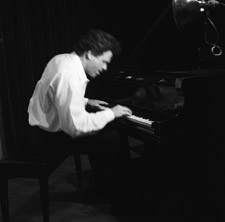
“And so I said, ‘Well, wait a minute now – why can’t I just do that on the bandstand?’ And it turned my life around. Because I no longer experience any concern of being judged when I’m playing; I no longer play and judge myself.”
Sacred or secular, regardless of the setting, there’s no difference in his approach; “None! That’s the beauty of it. It’s really cool. The only difference is the material, but every recording I have I put a spiritual on it, and I play something like that at every performance in a club, too.”
During his teens he had tried to incorporate funk grooves into the spirituals at his home church. “I was trying to play that kind of music at the church, and people were looking at me funny. Of course it wasn’t a black church; it was Pentecostal church in Niagara Falls. The people were so kind,” he chuckles, “but you could tell they were like, ‘What song is that???’”
A few were more vocal in their concerns; “I even heard that old ‘Jazz is the devil’s music’ thing, because I was starting to express an interest in jazz. You know how people are, man. They get afraid, and so they start judging.
“I had a band in high school, and we were playing the funk stuff and everything. Nobody was going to tell me it was coming from a bad place. I knew it was happy music, and the Bible says David danced, so…”
At Devoe Street, he could finally play gospel and spirituals the way he heard them. “Oh, yeah – and more so; because once you start, it’s like they’re egging you on, like; ‘Go ahead!’ It’s the most beautiful thing. And of course I’ve been there long enough that that’s the way I participate musically as well. When I’m playing with people I’m always exhorting them vocally, or when I’m in the audience, I participate. I think that’s valuable.
“There’s always the question of what part of jazz is African and what part is American, but I think the call and response amongst the players, the passing things down generation-to-generation orally, and the interaction between audience and performers is all very much an African thing.”
Those areas still pose a challenge for some white churches. Clapping in time, for instance. “Oh, it’s going to be stupid,” he laughs. “Although every now and then I kid around with people in church and I’ll say, ‘You know, you really don’t have rhythm.’ You do get somebody that’s up there that’s just all over the place. Although it’s much rarer than it was back home.”
With two major Gospel works, he’s begun to get noticed within the wider church community. “I get invited quite often now. Since I put out Joyful! I’ve been to several white churches, and they love it. It’s amazing how it really gets accepted now by people, they’re inviting me to their Lutheran Churches and their Episcopal Churches.”
Joyful! was a labor of love, but a costly one. The disc was self-financed, and the package includes a bonus DVD shot by Oscar winning documentarian Maryann De Leo (Chernobyl Heart) of a live concert along with interviews.
“When we put Joyful out – Jody my wife and I – it cost us a good forty grand. The performances are eating very nicely into that initial nut we dropped – I’m quite sure by now we’ve broken even – but I was not gonna do it half way. This is legacy here…so I want it like I want it.”
In addition to his gigging and church duties, Malinverni is also involved in the academic world. He holds a Bachelor’s Degree in Music Education from the prestigious Crane School of Music in Potsdam, and earned a Master of Music from the Purchase (NY) Conservatory of Music.
He’s served as Professor on the Jazz Faculties at New York University, William Paterson University, and currently, he’s back at the Purchase Conservatory, where he’s started a gospel choir – the Soul Voices Ensemble.
“I’ve got 82 kids in the choir this semester, and it’s beautiful. They’ve got nose rings, they’re gay and they’re lesbian, they’re black, they’re white, they’re everything. And they’re so joyful on the stage. I mean, last night we had a performance, and I swear to you, I was crying. Some of the kids were crying. I turn around, the audience is crying – ‘cause they’re these kid’s parents. These parents send their kids off to this Liberal Arts College, and they’re worried what’s going to happen – as you would worry as a parent. And they’re seeing these kids singing ‘Make a Joyful Noise Unto the Lord.’ We did ‘Keep Your Eyes On the Prize.’ I’ll do freedom songs, I’ll do old spirituals, I did a Sly and the Family Stone tune; ‘Everyday People.’ I arranged it. But it’s all African-American derivation. Even though I’m not African-American, I feel like the music I’m writing – this gospel stuff – is.”
Ironically, the choir membership is primarily Caucasian. “That’s the thing – it’s all white kids in their jazz program. So I went around campus to the African-American clubs, inviting them to join. First semester I had about four or five black kids. This semester I had about ten. Ten or twelve. So it’s my hope it continues to grow – that’s really what I want to have happen. I want it to be known as a place on campus that people can come together no matter what, and do something positive. It’s cool though, it’s been really well received.”
In many cases, the lyrics they sing are clearly Bible-based. “The 23rd Psalm, and all the Psalms? C’mon, that’s as ecumenical as you’re going to get. And not for nothing. That’s why I picked that text.” He steers clear of material that could be perceived as overtly evangelical. “I really don’t feel it would be appropriate to do stuff with New Testament text in a state setting. I don’t feel right about it. I think my beliefs would be too obvious. I make a real point to the kids every semester; ‘We’re going to do some stuff that comes from the Psalms, and other things, and I just want you to know, that my beliefs don’t matter to you. We’re doing this as an art form, and I invite you to feel it like you want.’ And I think that’s really the way you have to do it. You can’t proselytize.
 “You should see these kids up there,” he marvels, “I just sit there and say ‘You know, I could die right now a happy man.”
“You should see these kids up there,” he marvels, “I just sit there and say ‘You know, I could die right now a happy man.”
Malinverni rebelled soon after leaving home. “The minute I left for college,” he laughs. “Actually, I hung on for about a year, and then I went nuts. I had a ball. I mean, I never did anything crazy, but I had my fun. And it was a long time, although the things I learned in church, about how to act with folks, I don’t think I ever walked away from that.”
Part of the disillusionment stemmed from changes in his home church; “My church took to calling themselves a Full Gospel Church, and it was like a real literal reading of the Bible. Absolutely rule-bound. And I felt like I was just becoming more of a shell than an egg; it was almost like the dogma was propping me up.
“People would talk in the church about ‘Exactly what happens in the rapture?’ That’s so arrogant of us, to think that we can somehow rap our minds around that. I mean, golly. It becomes like this whole theological splitting of hairs, the old thing about how many angels can dance on the head of a pin.
“And I rebelled against that, and I think rightfully so. I wouldn’t go back to that church now, no way. Because to me, that’s not the kind of belief I want to walk around with, and meet humans with. I read the Bible faithfully, and of course I know the stories and all that, and have since I was a kid – but, to me, as long as you understand the word ‘grace,’ you know. And ‘mercy.’ That’s it.”
His return to the church occurred in a roundabout fashion.
“This is how God works; my first year, my freshman year, I was playing at this kind of hippie church on campus. That’s where I met Frederick Ennette, the guy who became my Pastor these many years later. He was going to school up there, too.
“The services themselves were kind of real milquetoast-y like. I just wasn’t feelin’ it. So I stopped going. I guess I was searching for a long time. And I was being a stupid kid, too.”
Years later, Ennette called. “He’d become a minister – a Baptist preacher. He had a new church, and they needed somebody to help out with the music, so I started going over and helping on an ad hoc basis, and eventually they asked me to be Minister of Music.”
It quickly turned from just another gig into something far more profound, and brought about a deeper faith for Malinverni. “I think it was the acceptance and love I found in this church, and let’s face it, seeing the miracle of my son being born – that’s really where I found my faith anew.
“We love being there. I bring my son every Sunday, and my wife’s in the choir. I don’t treat it as a gig. These people are family to us.”
Family is something he stresses repeatedly during our conversation.
He remains close with his parents, and credits their examples as having a considerable impact on his own faith.
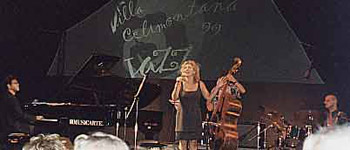
He plays on his wife, singer Jody Sandhaus’ solo albums, and they frequently tour together. Not surprisingly, they met at a gig. “But it wasn’t her gig; I was working with a friend of hers, a singer. And Jody just happened to be there. And boy, I was done. Soon as I saw her, I was smitten.” The couple have a twelve year old son, Peter Luca; “He’s quite a little musician himself. He plays the drums every Sunday at church, and he’s bad, I’ll tell ya – he’s got a nice little back beat on him.”
When Malinverni first arrived at Devoe, he was unaware of a strong Italian connection within the church. “This is really cool; Devoe Street was originally the First Italian Baptist Church of Brooklyn. Isn’t that something? It’s the most beautiful story; these old Italian folks, man, they founded this church, and there were some housing projects got put up where a lot of black people were living, and they went as missionaries and invited those people into their church to worship with them. So it was a white and black church, it was an Italian and black people church for many years. Over time the older folks died off, and their kids moved out into the suburbs, but there’s still a handful there. When I got there, they used to get such a kick out of this Italian kid coming back; like the church going around full circle. And me – growing up in an Italian Pentecostal church – I mean, I’m 100%. And where I grew up, the Italian people still were very much living in the same neighborhoods and stuff. I studied Italian, and I actually lived in Rome for several months years ago, so the whole thing, to me, it all rhymes. It just shows, you try to plan stuff, and it’s nowhere near gonna be as good as if you’d just trust.”
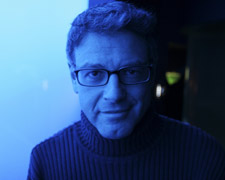
The fact that most church memberships are defined by ethnicity or color of skin as much as theological beliefs disturbs Malinverni. “I can only assume it’s a question of habit; that people go to the church their parents went to. I often invite people – white people – to come to performances at my church, and they’re like; ‘Will we stick out?’ And I’m like; “Well, it’ll be obvious you’re a different color, but people will be all over you to welcome you, because they’ll know you’re visiting. And these are people who are not prejudice or anything like that. They just don’t want to be embarrassed.
“I loved what Barack Obama said about 11:00 Sunday being the most segregated hour in America. He said it shouldn’t be…and I think so, too. I’m blessed to say the church where I am on a Sunday is not that way. Although I would say it’s 90% black. But it’s weird, because every time I walk in I feel so welcome. My son has grown up in that church. No one has ever made me feel anything less than a really prized member of that church.”
This month sees the premier of The Good Shepherd. It’s an enormous undertaking, but he’s unruffled by the pressure.
“I just can’t be bothered with worrying about stuff anymore. And believe me,” he laughs, “I’m one who will worry if possible.”
As a self-admitted control freak, he says it’s been freeing to let things go.
“And learning to trust, not feeling like I have to have my hand on the plough at all times. That if my heart’s in the right place, then leave it there; leave your burden there, as they say. In a way, that song ‘His Eyes on the Sparrow’ is really emblematic of the way I feel in my faith now. I don’t have to shout about it. I just live it.”
© John Cody 2008